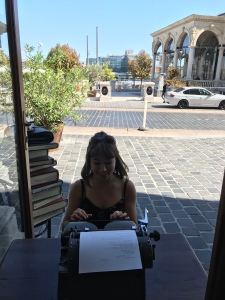Warning: It’s problematic to write a reflective review of this novel without revealing themes in it which are not introduced at the beginning of the book. There are no ‘spoilers’ per se, but reading this piece may influence your suspicions of what’s coming later for the early part of the reading journey.
There’s a lot to be said about Bernhard Schlink’s ‘The Reader’. Reading a translation of the original ‘Der Vorleser’ as a German learner, firstly, was an interesting experience. At times it was natural and easy to forget that the text wasn’t originally composed in English, and Carol Brown Janeway’s translation is flawless. There were no ‘Germanisms’, really, which stood out as awkward in translation – indeed the skill of converting a novel from one language to another is smoothing over these little bumps and (a difficult task) conveying the full sense of the original German in natural English. The translator is tasked with writing the novel as beautifully as the original author, only their scope for expression is far more limited; they must remain as true to the original as possible. Janeway’s finesse and experience is well-exhibited.
I did find myself occasionally wondering, however, how exactly did Schlink write that sentence? And especially with the more philosophical, weighty considerations on subjects and values so inherently entangled with German history and culture, does it have a sense in German which simply can’t be translated? Cultural evolution shapes language – have the processes which have shaped today’s generation of Germans also given them expressions of feeling which just don’t resonate as strongly in our language of the constitutional monarchy and ‘stiff upper lip’?
Just look at the word which German has to describe the theme which Schlink deals with so absorbingly and perceptively: Vergangenheitsbewältigung. ‘Vergangenheit’ translates directly as ‘past’ and ‘bewältigung’ as ‘handling’ or ‘coming to terms’. A translation in a German-to-English dictionary reveals little more: ‘process of coming to terms with the past’.
And yet, this noun carries major weight in German: the struggle of a nation to deal with the negative aspects of its past. Duden (the equivalent of our Collins or Oxford Dictionary) cites ‘public debate within a country on a problematic period of its recent history – in Germany on National Socialism, in particular’.
Pretty lengthy in English, and it doesn’t have quite the same melancholy cadence.
This is the essential theme of Schlink’s profound work, focussing on the guilt and struggle of the ‘Nachgeborenen’ (a term coined by Bertolt Brecht, literally meaning ‘later-born’ and here applying to the generation which followed the Nazi era and was forced to deal with its legacy).
It is interesting that Schlink does not introduce this, undoubtedly the book’s central and intended theme, until at least a third of the way into the novel. He begins, in the voice of ‘nachgeboren’ narrator Michael Berg, by telling the story of the fifteen-year-old’s relationship with an older woman. Part One details the development of this passionate love affair which is terminated when Hanna, Michael’s lover, leaves town. The next episode opens on the trial of a group of female defendants who worked in a Nazi concentration camp, Hanna amongst their number.
The issue of ‘Vergangenheitsbewältigung’ suddenly besieges the reader. We are forced to deal with it – is Schlink trying to emulate the sudden (in the sense of one generation following many) realisation of national responsibility and guilt experienced by post-war generations? Is he establishing metaphors and parallels in this early narrative of normal, post-Nazi German life? Or does Schlink simply use this section to characterise Hanna – giving her thoughts, emotions and a lover, which later serve to complicate our complete condemnation and persecution of her?
Schlink certainly raises questions, some of which he answers for us, others which are left nagging – and he isn’t just asking us to consider his literary technique. ‘The Reader’, without demanding a definite and universal conclusion from its reader, prompts deep moral reflection and consideration of the significance of our collective, and individual, past.
